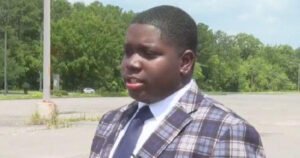The touch brought Steven Casto closer to God. Then, in 2020, touch became taboo.
“I felt sad,” said Steven of the pandemic restrictions that threatened to isolate him in his
dark, silent world. “For two years, I wasn’t able to interact with others.”

Steven is blind and deaf. The 61-year-old “sees” his world through touch — people, places, and things. That sense, sharpened by necessity, brings Steven great joy.
“I love to touch flowers,” he said. “They help me understand more about our Creator.”
Steven learned about his Creator by studying the Bible using tactile signing, a form of sign
language that relies on touch rather than sight. Tactile signing has been his connection to
worship with a congregation of Jehovah’s Witnesses since he was baptized in October of
2012.
In March of 2020, in response to the threat of COVID-19, Jehovah’s Witnesses suspended
all in-person congregation gatherings, replacing them with virtual meetings held via
videoconferencing applications.
“God views life as sacred, and so do we,” said Robert Hendriks, U.S. spokesman for
Jehovah’s Witnesses, regarding the organization’s decision. “The value of life transcends
even the value of Christians meeting together.”
Jehovah’s Witnesses have long cared for the needs of the deaf and blind. For over a
century, the organization has produced Bible-based publications for the blind. Today, Bible
study material is available in Braille — as well as 100 sign languages — on the Witnesses’
official website, jw.org.
“When meetings were suspended, I was concerned because he was so isolated,” said
Quintin Blue, a Washington, D.C. native began learning ASL as a foreign language in
school when he was 13 years old. “I was afraid that he wouldn’t know the love we have for
him; I didn’t have the chance to see him for two years.”
Love for Steven moved his fellow worshipers to action. They helped him attend and
communicate during ASL group meetings, held on Zoom, with the aid of a TTY Braille
system. “He could use his TTY Braille to converse and be part of the meeting even though
he was home alone,” said Paul Chesnavage, a congregant that helped provide Steven with
communication access.



